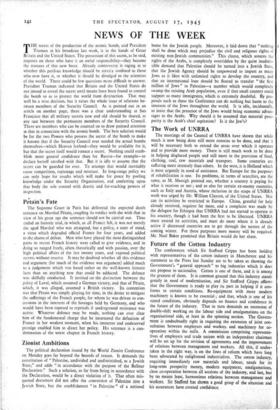NEWS OF THE WEEK
THE secret of the production of the atomic bomb, said President Truman in his broadcast last week, is in the hands of Great Britain and the United States. The possession of this secret, as he said, imposes on those who have it an awful responsibility—they become the trustees of this new force. Already controversy is raging as to whether this perilous knowledge should be strict;y confined to those who now have it, or whether it should be divulged to the scientists of the world. There could be few questions mare difficult to answer. President Truman indicated that Britain and the United States do not intend to reveal the secret until means have been found to control the bomb so as to protect the world from destruction. That may well be a wise decision, but it raises the whole issue of relations be- tween members of the Security Council. As is pointed out in an article on another page, there was a clear understanding at San Francisco that all military secrets new and old should be shared, at any rate between the permanent members of the Security Council. There are members who can be counted on to draw pointed attention to that in connection with the atomic bomb. The best solution would be for the two Powers who possess the secret of the bomb to make it known that if the Security Council ever needed the actual bombs themselves—which Heaven forfend—they would be available for it, but that the secret itself would remain a secret. Nothing could estab- bli.sh more general confidence than for Russia—for example—to declare herself satisfied with that. But it is idle to assume that the secret can be guarded for ever. To attempt that would inevitably cause competition, espionage and mistrust. In long-range policy we can only hope for results which will make for peace by pooling knowledge under the Security Organisation, and conferring upon that body the sole control with drastic and far-reaching powers of inspection.


























 Previous page
Previous page